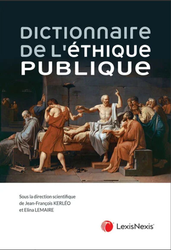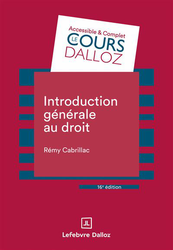The recent news

Sept. 30, 2025
Publications

🌐follow Marie-Anne Frison-Roche on LinkedIn
🌐subscribe to the Newsletter MAFR Regulation, Compliance, Law
🌐subscribe to the Video Newsletter MAFR Surplomb / Overhang
🌐subscribe to the Newsletter MaFR Droit & Art
____
 ► Full Reference: M.-A. Frison-Roche, If King Solomon's probationary strategy hadn't worked, Working Paper, October 2025.
► Full Reference: M.-A. Frison-Roche, If King Solomon's probationary strategy hadn't worked, Working Paper, October 2025.
____
📝 This Working Paper is the basis of the article dedicated to Professor Pierre Crocq.
____
► Summary of this Working Paper: The
_____
🔓read the developments below⤵️
Sept. 27, 2025
Newsletter MAFR - Law, Compliance, Regulation

🌐suivre Marie-Anne Frison-Roche sur LinkedIn
🌐s'abonner à la Newsletter MAFR Regulation, Compliance, Law
🌐s'abonner à la Newsletter en vidéo MAFR Surplomb
🌐s'abonner à la Newsletter MaFR Droit & Art
____
► Référence complète : M.-A. Frison-Roche, "Exerçant un pouvoir de sanction, le Régulateur doit informer la "personne concernée" de son droit de se taire (cons. const., 26 sept. 2025)", Newsletter MAFR Law, Compliance, Regulation, 27 septembre 2025
____
📧Lire par abonnement gratuit d'autres news de la Newsletter MAFR - Law, Compliance, Regulation
____
► Résumé de l'article : Le Conseil constitutionnel a rendu le 26 septembre 2025 une décision n°2025-1164 , Société Eurotitrisation et autres qui déclare une disposition du Code monétaire et financier contraire à la Constitution.
Le Conseil déclare, et cela ne surprend pas notamment parce qu'il enrichit une jurisprudence débutée en 2016 affirmant régulièrement le caractère constitutionnel et autonome du "droit de se taire", que le fait pour le CMF de ne pas contraindre la Commission des sanctions de l'Autorité des marchés financiers (AMF) à informer une personne concernée de son droit de se faire rend de ce meme fait le dispositif procédural organisé par ce texte (IV de l'art.L 621-15 CMF, qui ne formulait qu'en termes généraux l'obligation de respecter le principe du contradictoire et des droits de la défense, sans viser le droit de se taire) contraire à la Constitution.
Cette sanction, intègre donc la règle dans la loi française, car en censurant à effet immédiat un silence le Conseil injecte immédiatement le droit de se taire dans les procédues en cours devant la Commission des sanctions de l'AMF (I). La solution était prévisible et vaut pour toutes les Autorités de régulations (II). Mais elle montre les tensions entre l'exercice du pouvoir spécial de sanction, qui appelle le droit de se taire au profit des "personnes concernées" et le pouvoir général de régulation, dont la sanction n'est pourtant qu'un outil, régulation qui suppose l'obtention d'informations et supporte mal ce silence (III). Plus largement, c'est l'affrontement entre l'impératif des secrets et l'impératif de l'information qui se déroule (IV).
____
📧lire l'article publié le 27 septembre dans la Newsletter MAFR - Law, Compliance, Regulation
Sept. 23, 2025
Conferences

🌐suivre Marie-Anne Frison-Roche sur LinkedIn
🌐s'abonner à la Newsletter MAFR Regulation, Compliance, Law
🌐s'abonner à la Newsletter en vidéo MAFR Surplomb
🌐s'abonner à la Newsletter MaFR Droit & Art
____
► Référence complète : M.-A. Frison-Roche, "Qu'est-ce que le "Gouvernement des juges" dans un office renouvelé par le Droit de la compliance, in table-ronde "faut-il craindre le gouvernement des juges ?", Fondation Colbert, Le droit et son impact sur l’économie. Comment en faire un atout pour la France , France-Amérique, 9 avenue Franklin-Roosevelt, 75008 Paris, 23 septembre 2025.
____
Cette intervention s'insère dans une des deux tables-rondes de la manifestation.
► Consulter le programme général de la manifestation
____
► Résumé de l'intervention : Pour se poser l'alternative de la "crainte", soit celle de l'absence de régles de droit, soit celle de l'omnipotence des juges, il convient d'une façon plus calme de rappeler ce qu'il appelle si souvent "le gouvernement des juges". L'expression n'est pas technique, elle exprime souvent en elle-même la crainte, voire la détestation des juges. C'est l'épouvantail par excellence. Comme d'ailleurs la "dérégulation", qui sans doute est confondue avec la simplification des réglementations.
Toujours est-il puisqu'on nous le demande, empruntons les voies des expressions convenues, ce que l'on appelle hors des textes de droit, le "gouvernement des juges". Cela serait donc des "juges". Et qui "gouverneraient".
I. Les "juges".
Lesquels ?
Les personnes qui parlent du "gouvernement des juges" visent les juges judiciaires. Car les juges administratifs, comme le Conseil d'Etat, dans son fonction juridictionnelle qui touche l'ensemble de l'action économique de l'Etat français, semble moins être la cible. Moins lorsqu'il s'agit des tribunaux administratifs, lorsqu'ils répondent aux questions posées par les ONG sur les engagements climatiques des personnes publiques. De même que les juges européens, comme la Cour de justice de l'Union européennes lorsqu'elle bloque le transfert des données personnelles de l'Europe vers les Etats-Unis, semblent moins visés.
Non, c'est avant tout le juge judiciaire : le juge pénal (abus de biens sociaux), le juge civil (contentieux de la vigilance), le juge social).
Et c'est avant tout le juge français. Le juge américain semble moins critiqué. Notamment en ce moment. Pour deux raisons. D'abord, parce que le système constitutionnel n'est pas le même (check and balance) et ici, cela est rappelé à chaque fois, le juge en France est une autorité dont le Président, qui lui est un pouvoir, a la garde. Mais à la fin, l'on regarde que la différence entre un pouvoir et une autorité peut être fine (en Droit économique, empli de droit souple, on le sait bien).
Voilà pour le Juge.
Que faudrait-il craindre d'eux ?
II. qui "gouvernent"
Qu'est-ce que gouverner.
L'office du juge est rappelé dans l'article 12 du Code de procédure civile, dont la portée est générale.
Il dispose :"Le juge tranche le litige conformément aux règles de droit qui lui sont applicables. Il doit donner ou restituer leur exacte qualification aux faits et actes litigieux sans s'arrêt à la dénomination que les partis en auraient proposées".
L'idée française est effectivement que le juge civil est là pour trancher une dispute entre deux litigants particuliers sur un différent singulier. Cela est vrai quelque soit l'ampleur du différent, notamment le montant financier en jeu, quelque soit le sujet dont il s'agit. Cela est vrai aussi pour le juge administratif et pour le juge pénal, qui restaure la légalité, qui a été objectivement froissée par l'infraction (pénal) ou par l'adoption d'un texte non-conforme à une norme supérieur (contrôle de légalité ou de constitutionnalité).
La "dispute" cesse alors d'être purement "subjective", entre deux parties qui se disputent, elle devient plus "objective", soit entre une personne et une loi (droit pénal, le délinquant ayant comme abimé la loi), soit entre deux textes (la loi inconstitutionnelle détériorant la Constitution).
Cela ne remet pas en cause l'office que l'on dit "neutre" du juge, qui est au service des parties, puisqu'il met fin à leur dispute, la loi n'ayant que son instrument pour ce faire, et au service de la loi elle-même, puisqu'il est le gardien neutre de la hiérarchie des normes et de l'Etat de Droit.
L'idée de "gouvernement" renvoie à tout autre chose : l'idée de faire des choix pour le futur d'un groupe social. C'est en cela que le "gouvernement" est indissociable du pouvoir et de l'emprise sur le futur.
La résolution des disputes particulières de droit économique, la restauration de la légalité des textes à portée économique a toujours eu un effet économique majeure. La considération par les juges qui résolvent les disputes et restaurent la légalité a toujours existé, que l'on soit en systèmes de Civil Law ou en systèmes de Common Law (distinction professorale que l'on a toujours exagérée).
Le juge ne peut pas refuser de statuer et de répondre à la question que les parties lui posent. L'article 5 du Code civil interdit les "arrêts de réglement" en ces termes : "Il est défendu aux juges de prononcer par voie de disposition générale et réglementaire sur les causes qui leur sont soumises"
Mais il est précédé par l'article 4 du Code civil, l'ordre des 2 articles montrant que c'est celui-ci qui est le plus important : " Le juge qui refusera de juger, sous prétexte du silence, de l'obscurité ou de l'insuffisance de la loi, pourra être poursuivi comme coupable de déni de justice".
Le "gouvernement des juges ne vise donc pas le fait de prendre des décisions à très grand impact économique, même à effet "systémique", si les parties le demandent, le juge étant toujours obligé d'interpréter la loi. Il s'agit plutôt de faire à cette occasion des choix pour l'avenir économique et social d'un groupe social, d'une Nation.
Le juge a-t-il (ou doit-il) en matière économique faire des choix pour le futur du groupe social via les questions de dimensions économiques qui lui sont posées ?
C'est aujourd'hui la question qui est posées à travers le monde, que l'on soit en Europe (Contentieux systémique émergent), en Chine (A.I.) et aux Etats-Unis.
III. Le bouversement de ce que font les juges du fait du Droit de la Compliance
Mais ces éléments classiques de la question posée sont renouvelés du fait de l'émergence d'une nouvelle branche du Droit : le Droit de la compliance
_____
mafr, Vers un gouvernement économique des juges, 2005
________
Sept. 15, 2025
Conferences

🌐follow Marie-Anne Frison-Roche on LinkedIn
🌐subscribe to the Newsletter MAFR Regulation, Compliance, Law
🌐subscribe to the Video Newsletter MAFR Surplomb
🌐subscribe to the Newsletter MaFR Droit & Art
____
► Full Reference: M.-A. Frison-Roche, "Compliance Law and Systemic Litigation", 15 September 2025, Madrid.
____
This speech is the opening speech of the event.
🧮 See the general program of the event
____
📅See the slides (not used), basis for this speechs
____
► Summary of the conference: This manifestation, made fo many interventions, is about the role and the evolution of the in-house lawyers in the Europe on the move. I opened the event by focusing on the importance of the Compliance which drives the companies now, in the future and for the future. It is quite difficile because currently Compliance Law is quite misunderstund by almost every. Therefore the first part of my intervention has been the explanation of what is the very new branch of Law, built of political Monumental Goals (Compliance Law is not just the obligation to be conform with, just to obey), the specificity of European Compliance Monumental Goals (not only the sustainability of systems, but also the concern for present and future human beins implied in them).
This systemic new branch of Law, humanist branch of Law in Europe put the Judge at its center.
Par translation, this is creating a new sort of Litigation : the Compliance Systemic Litigation. Its object is the future (as Compliance Law itselft).
Contrary to the "conformity", which might be left to algorithms, Compliance Law, inseparable to Systemic Litigation, are giving new role for Judges, for external lawyers and for internal lawyers.
________
Sept. 10, 2025
Publications

🌐follow Marie-Anne Frison-Roche on LinkedIn
🌐subscribe to the Newsletter MAFR Regulation, Compliance, Law
🌐subscribe to the Video Newsletter MAFR Surplomb
🌐subscribe to the Newsletter MaFR Droit & Art
____
► Full Reference: M.-A. Frison-Roche, "Régulation" (Regulatory Law), in J.-Fr. Kerléo et E. Lemaire (dir.), Dictionnaire de l'éthique publique, LexisNexis, 2025, pp.
____
📗read the general presentation of the Dictionary.
____
📝read the article (in French)
_____
► English Summary of this article defining Regulation: To define Regulation (Regulatory Law), the article begins with its origins, which were a source of misunderstanding, since the term Regulation might refer to simple regulations, thus masking the real branch of Law which is the Law of Regulation. But this confusion with simple and formal regulations has diminished Regulatory Law its importance, its novelty and its originality, and, by placing it within Public Law, equated Regulation on the one hand with the transition from public monopolies to a competitive organisation, and on the other hand privileged the legal study of what fell within the remit of the Administrative Courts, i.e. telecommunications, transport and energy, leaving out the Regulatory Law of banking and financial sector . As a result, the unity and strength of Regulatory Law is still difficult to perceive and manage today, while its relationship with competition and Europe remains difficult.
Regulatory Law is all the more difficult to define because it is still common to oppose, as was the case in the 1980s, "Economic Regulatory Law", which would aim to set economic efficiency objectives within the State, and "Public Liberties Regulatory Law", which would be alternatives to each other, preventing the audiovisual, media and digital sectors in particular from being legally perceived as an industry. We are still paying for this initial conception. All the more so since Regulatory Law is the second pillar on which Europe is built, along with Competition, with which it is linked. It can be identified by the existence of a regulated 'sector', most often through the establishment of a regulatory authority, generally in the form of an Independent Administrative Body. But it is defined by the prevalence of the technical and political goals pursued, which are not spontaneously achieved and which aim to favour the human beings involved in economic organisations.
While the function of Competition Authorities is to maintain the dynamism of competitive markets and to punish behaviour that hinders them without creating that dynamism, Regulatory Law, through its own rules, principles, institutions, procedures and decisions, will create non-spontaneous équilibra and maintain them over time. To do this, it will inject non-spontaneous procedures, such as transparency, or generate obligations and powers because these are necessary for this balance to be achieved. This can take the form of exclusive rights, which can go as far as the creation of monopolies, particularly on transport infrastructures, or the form of pricing and tarification, which can go as far as free access. Access rights are essential, whether technical or political (access to networks, access to healthcare).
The political dimension of Regulatory Law is very much in evidence, as Europe is developing its own form of Regulation compared with the USA or China, demonstrating the link between Regulation and Sovereignty, the criterion? of the technical sector becoming less significant. This is illustrated by the clash over algorithmic systems (AI). In this way, regulation is not a technical reaction to a "market failure", but the manifestation of a zone's political power both internally and externally. The DSA (2022) is an example of this, imposing this same logic extraterritoriality in the digital space through the Digital Services Act (DSA) adopted in 2022.
____
📝read the presentation of the other article written by Marie-Anne Frison-Roche for this Dictionary: "Compliance"
________
Sept. 10, 2025
Publications

🌐follow Marie-Anne Frison-Roche on LinkedIn
🌐subscribe to the Newsletter MAFR Regulation, Compliance, Law
🌐subscribe to the Video Newsletter MAFR Surplomb
🌐subscribe to the Newsletter MaFR Droit & Art
____
► Full Reference:: M.-A. Frison-Roche, "Compliance", in J.-Fr. Kerléo & E. Lemaire (dir.), Dictionnaire de l'éthique publique, LexisNexis, 2025, pp.
____
📗 read the general presentation of the Dictionary.
____
📝read the article (in French).
_____
► English Summary of the article defining what is Compliance: The article explains Compliance in 7 points.
Firstly, it states that Compliance oscillates between a weak and a strong definition. It can be defined weakly as the demonstration of obedience to all applicable regulations, or it can be defined strongly as active participation in the achievement of 'monumental' ambitions for the future of the social group. Positive legal rules and case law are increasingly revealing the relevance of the strong definition, with the weak definition referring only to conformity to the Law.
Secondly, this understanding of the new branch of Law known as Compliance Law will enable us to master the regulations specifically relating to compliance (RGPD, French laws such as Sapin 2 Act and Vigilance Act, AML/FT, European AI Act, etc.), which are both more specific and more restrictive than the general obligation to comply with the applicable legal rules.
Thirdly, everyone can see the move from "extraterritoriality" to another thing which is the indifference to territoryd: Compliance is the right instrument for the digital space and for chains of activities.
Fourthly, this is due to the very nature of Compliance, which consists in internalising in companies in a position to be active the “Monumental Negative Goal” of preventing the collapse of systems (energy, climate, digital, banking, financial, algorithmic, etc.).
Fifthly, this internalisation is carried out by States and public authorities in entities in a position to act, i.e. in concrete terms in companies in a position to be active to reach the “Monumental Goals” by contributing to the improvement of systems so that these systems benefit in the present and the future the people who are de jure and de facto involved in them.
Sixthly, these goals become positive when it comes to educating people about probity and effective equality between human beings, notably through training policies. In this respect, Vigilance is the “cutting edge” of Compliance.
Seventhly, an “ex ante responsibility” of Crucial Operators subject to Compliance is emerging, and is articulated by Systemic Litigation which aims to balance and maintain systems, carried by States and these crucial companies.
____
📝read the preentation of the other article written by Marie-Anne Frison-Roche for this Dictionary: "Régulation"
________
Sept. 6, 2025
Editorial responsibilities : Direction of the collection "Cours-Série Droit privé", Editions Dalloz (33)

► Référence complète : R. Cabrillac, Introduction générale au droit, 1ière éd. 1995 - 16ième éd., 2025, Dalloz, Coll. "Cours Dalloz-Série Droit privé", 294 p.
____
Le droit est réputé complexe, voire rébarbatif. Pour dépasser cette impression, qui ne correspond pas à sa nature, cet ouvrage, résolument pédagogique, s’adressent aux étudiants qui prennent contact pour la première fois avec la matière.
Il décrit tout d’abord les fondements du droit, ses origines et ses classifications puis il expose les sources du droit, les preuves et le procès.
► Structure du Cours :
- Les fondements du droit contemporain
- Les sources du droit
- La preuve des droits
- Les juridictions civiles
- Le déroulement d'un procès
- La réalisation contentieuses
Il est complété par des tests de connaissances.
____

Aug. 29, 2025
Publications

🌐follow Marie-Anne Frison-Roche on LinkedIn
🌐subscribe to the Newsletter MAFR Regulation, Compliance, Law
🌐subscribe to the Video Newsletter MAFR Surplomb
🌐subscribe to the Newsletter MaFR Droit & Art
____
 ► Full Reference: M.-A. Frison-Roche, Compliance Law and Systemic Litigation, Working Paper, August 2025.
► Full Reference: M.-A. Frison-Roche, Compliance Law and Systemic Litigation, Working Paper, August 2025.
____
📝 This bilingual Working Paper is the basis of the article published in French "Droit de la compliance et contentieux systémique"
____
► Summary of this Working Paper: Legal systems have changed, and Compliance Law, in its uniqueness, reflects this change and plays a powerful role in it. New sets of compliance rules, particularly at European Union level, covering data protection (GDPR), anti-money laundering (AMLA), climate balance protection (CS3D) and banking and financial system sustainability (Banking Union), have been developed and imposed on large companies, which must implement them: alerts, mapping, assessment, sanctions, etc. These new regulatory frameworks only make sense in relation to their ‘Monumental Goals’: to detect systemic risks ex ante and prevent crises so that the systems in question do not collapse, but ‘last’. All the legal instruments in the corpus are normatively rooted in these monumental goals, which are the core that unifies Compliance Law (I).
The judge is the guardian of this new and highly ambitious regulatory framework, which relies on the practical ability of companies to implement it (II). Courts ensure that the legal technical provisions are applied in a teleological manner in each of these compliance blocks and that the regulations support each other, because all compliance regulations serve the same systemic goal: to ensure that the systems (banking, financial, climate, digital, energy, etc.) do not collapse, but sustains, and that present and future human beings are not crushed by them, but rather benefit from them. This unity is still little perceived because so meticulous regulations pulverise this profound unity of Compliance Law into a myriad of changing provisions. Entrusting the ‘regulatory mass’ to algorithms increases this fragmentation, making the whole even more incomprehensible and therefore impossible to handle. On the contrary, recognising the judge's place, i.e. at the centre, makes it possible to master this new branch of law. But the judge's sole function is not to restore clarity to a body of law covered by the dust of its own technicality.
There is a transfer to Litigation of the systemic object of Compliance Law. Indeed, the litigation that emerges from the new Compliance Law is itself fundamentally new, by transitivity. Indeed, the purpose of Compliance Law is to make systems sustainable (or resilient, or robust, depending on the terminology used). This results in litigation that is itself ‘Systemic Litigation’ (III), most often brought by an organisation against a systemic operator. The place and role of each party are transformed (IV).
____
🔓read the developments below⤵️